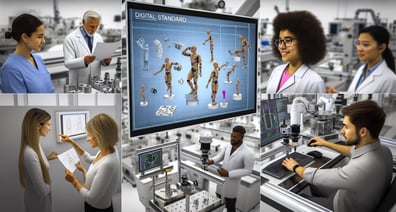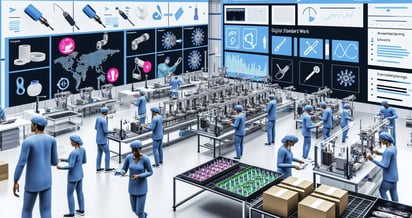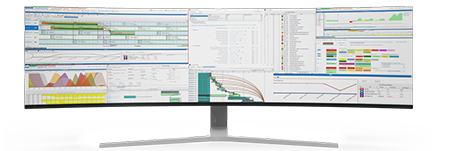Implementing Digital Standard Work for Efficient Scheduling
Manufacturers in the medical industry face unique challenges, such as strict regulatory requirements, varying demand, and the need for utmost quality control. To meet these demands and stay competitive, medical manufacturing facilities are turning to advanced technologies and digital solutions. One such solution that has gained prominence is the integration of PlanetTogether with leading Enterprise Resource Planning (ERP), Supply Chain Management (SCM), and Manufacturing Execution Systems (MES) platforms like SAP, Oracle, Microsoft, Kinaxis, Aveva, and others.
This blog explores the concept of Digital Standard Work and its application in medical manufacturing scheduling. We will look into the benefits of implementing such a system and how the integration of PlanetTogether with major ERP, SCM, and MES systems can drive efficiency and excellence in medical manufacturing.

Digital Standard Work
Digital Standard Work, also known as DSW, is a comprehensive approach to streamline and standardize manufacturing processes through the use of digital tools and technologies. It aims to create a structured framework that ensures consistency, repeatability, and efficiency in manufacturing operations. For medical manufacturing, where precision and adherence to protocols are vital, Digital Standard Work is a game-changer.
Key Components of Digital Standard Work
Digital Work Instructions: Replace paper-based instructions with digital, interactive documents that guide operators through each step of the manufacturing process. These instructions can incorporate images, videos, and interactive checklists to ensure compliance.
Real-time Data Capture: Utilize IoT sensors, RFID technology, and other data-capturing methods to gather real-time information about equipment status, material availability, and production progress. This data is crucial for decision-making and analysis.
Workflow Automation: Implement automation to reduce manual tasks and errors. Automated processes can include inventory replenishment, quality checks, and equipment maintenance scheduling.
Integration with ERP, SCM, and MES Systems: Seamlessly connect Digital Standard Work with your existing systems to enable data flow and synchronization across the entire manufacturing ecosystem.

Benefits of Implementing Digital Standard Work
Improved Compliance: In the highly regulated medical manufacturing industry, compliance with industry standards and quality control protocols is non-negotiable. Digital Standard Work ensures that every step of the manufacturing process is documented and followed precisely, reducing the risk of compliance issues.
Enhanced Efficiency: By digitizing work instructions and automating routine tasks, the manufacturing process becomes more efficient. Operators can focus on value-added activities, while automation handles repetitive tasks.
Reduced Errors: Automation and digital guidance minimize human errors, leading to a decrease in defects and recalls. This not only saves costs but also enhances the reputation of the manufacturing facility.
Increased Visibility: Real-time data capture and integration with ERP, SCM, and MES systems provide visibility into the entire manufacturing process. Managers can track progress, identify bottlenecks, and make data-driven decisions.
Flexibility and Adaptability: Digital Standard Work can be easily updated and adapted to changing requirements, ensuring that the manufacturing facility remains agile and responsive to market demands.


PlanetTogether Integration with ERP, SCM, and MES Systems
Now, let's explore the crucial aspect of integrating PlanetTogether with leading ERP, SCM, and MES systems in medical manufacturing.
PlanetTogether is a robust Advanced Planning and Scheduling (APS) software that empowers manufacturers to optimize their production processes. It offers features like capacity planning, demand forecasting, and what-if analysis, making it an ideal choice for medical manufacturing facilities.
Integration with ERP Systems
Integrating PlanetTogether with ERP systems like SAP, Oracle, or Microsoft Dynamics enables seamless data exchange. This means that production schedules generated by PlanetTogether can be automatically synchronized with ERP data, ensuring that orders, materials, and resources are aligned for efficient production.
Integration with SCM Systems
In a complex medical supply chain, integration between PlanetTogether and SCM systems like Kinaxis allows for synchronized demand and supply planning. Real-time data from the SCM system informs PlanetTogether's scheduling algorithms, optimizing inventory levels and reducing lead times.
Integration with MES Systems
MES systems play a critical role in capturing real-time data from the shop floor. Integrating PlanetTogether with MES systems like Aveva ensures that scheduling decisions are based on the most current production data, minimizing disruptions and enhancing overall efficiency.
Challenges and Considerations
While the benefits of implementing Digital Standard Work and integrating PlanetTogether with ERP, SCM, and MES systems in medical manufacturing are evident, there are challenges to be aware of:
Initial Investment: The implementation of such integrated systems requires a substantial initial investment in technology, software, and employee training.
Change Management: Transitioning to Digital Standard Work may face resistance from employees accustomed to traditional processes. Effective change management strategies are essential for a smooth transition.
Data Security: Medical manufacturing facilities handle sensitive patient data and intellectual property. Robust cybersecurity measures must be in place to protect this information.
Continuous Maintenance: Integration and digital systems require ongoing maintenance and updates to remain effective and secure.
Implementing Digital Standard Work and integrating PlanetTogether with leading ERP, SCM, and MES systems in medical manufacturing is a strategic move toward achieving efficiency, compliance, and excellence. It empowers manufacturers to adapt to changing market demands, reduce errors, and enhance overall productivity.
The synergy between digital technologies and established manufacturing processes can lead to better patient outcomes by ensuring the timely delivery of high-quality medical devices and products. As the medical manufacturing industry continues to evolve, embracing these digital advancements becomes not only a competitive advantage but also a necessity for those striving to excel in this vital field.
Are you ready to take your manufacturing operations to the next level? Contact us today to learn more about how PlanetTogether can help you achieve your goals and drive success in your industry.